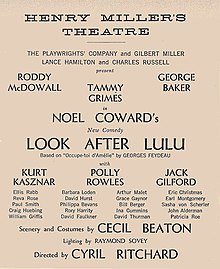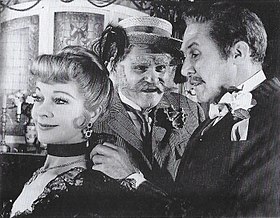Look After Lulu!
The central character is an attractive cocotte, Lulu, whose lover is called away on military service; the plot involves libidinous foreign royalty, a mock wedding that turns out to be real, people hiding under beds and in bathrooms, and a happy ending.[2] No English version of the text had been published, and Barrault and Renaud suggested to Laurence Olivier and Vivien Leigh that they ask Coward to adapt the play.[1] His second choice was Carol Channing: Cyril Ritchard, who was to direct the production, and Roddy McDowall, cast as the male lead, suggested Tammy Grimes, who had not done a Broadway "book" show; Coward saw her cabaret act and immediately offered her the role.[5] After a tryout in New Haven, Connecticut, the play premiered on Broadway at the Henry Miller's Theatre on 3 March 1959 and closed on 4 April 1959 after 39 performances.Marcel arrives and explains that the letter was a ruse to fool his rich godfather, Herr Van Putzeboum, who is certain to make him a generous settlement if he marries (or seems to).Van Putzeboum is expected to arrive at any moment, and Marcel persuades Lulu take part in a bogus wedding ceremony, in return for ten per cent of the fortune.Marcel wakes up with a hangover to find to his horror that the bump in the bed next to him is not, as he assumed, his pet dog, but is Lulu.Lulu climbs back into the bed – just as Van Putzeboum enters to discover what he assumes is the engaged couple indulging in a little premarital familiarity.As she steps out of her dress and into his embrace, Marcel arrives to break the news that the "mock" wedding was in fact real.Lulu is not impressed that he is so horrified at being married to her: "I can't see why you should be so against the idea: I'm sound in wind and limb, and fairly popular".In The Daily News, John Chapman thought the elaborate décor by Cecil Beaton and a too strenuous attempt to be funny on the part of some of the cast weighed the piece down.[17] The play was revived at the Chichester Festival in 1978 in a production by Patrick Garland, which transferred to the Haymarket Theatre, London, where it ran for 56 performances.

Noël CowardOccupe-toi d'Amélie!Georges FeydeaucocotteBroadwayWest EndJean-Louis BarraultMadeleine RenaudLaurence OlivierVivien LeighShirley MacLaineCarol ChanningGentlemen Prefer BlondesSam ZolotowCyril RitchardRoddy McDowallTammy GrimesNew HavenHenry Miller's TheatreRoyal Court TheatreChelseaNoël Coward TheatreTony RichardsonGeorge DevineAnthony QuaylePeter StephensBarbara LodenFanny CarbyGeorge BakerRobert StephensPaul SmithEric ChristmasPeter SallisPolly RowlesMeriel ForbesEllis RabbJack GilfordArnold YarrowKurt KasznarMax AdrianReva RoseEarl MontgomeryArthur MaletRichard GooldenPhilippa BevansBarbara HicksDavid HurstMichael BatesLes Cloches de CornevilleCosì fan tutteThe Daily NewsCecil BeatonThe New York TimesBrooks AtkinsonHarold HobsonThe Sunday TimesChichester FestivalPatrick GarlandHaymarket TheatreGeraldine McEwanClive FrancisGary RaymondBrian Rixtelevised version of the play in 1967Elspet GrayAnton RogersTrewin, J. C.Graham PaynSheridan MorleyHoare, PhilipMander, RaymondJoe MitchensonLondon Calling!On with the DanceThis Year of GraceWords and MusicSet to MusicSigh No MoreOh, Coward!Cowardy CustardBitter SweetConversation PieceOperettePacific 1860Ace of ClubsAfter the BallSail AwayThe Girl Who Came to SupperThe Rat TrapI'll Leave It to YouThe Better HalfThe Young IdeaThe VortexHay FeverFallen AngelsEasy VirtueThe Queen Was in the ParlourSemi-MondeThis Was a ManSiroccoThe MarquiseHome ChatPrivate LivesPost-MortemCavalcadeDesign for LivingPoint ValaineTonight at 8.30Present LaughterThis Happy BreedBlithe SpiritPeace in Our TimeSouth Sea BubbleRelative ValuesQuadrilleNude with ViolinWaiting in the WingsSuite in Three KeysIn Which We ServeBrief EncounterThe Astonished HeartPomp and CircumstancePresent IndicativeFuture IndefiniteThe Noël Coward DiariesTonight Is Ours